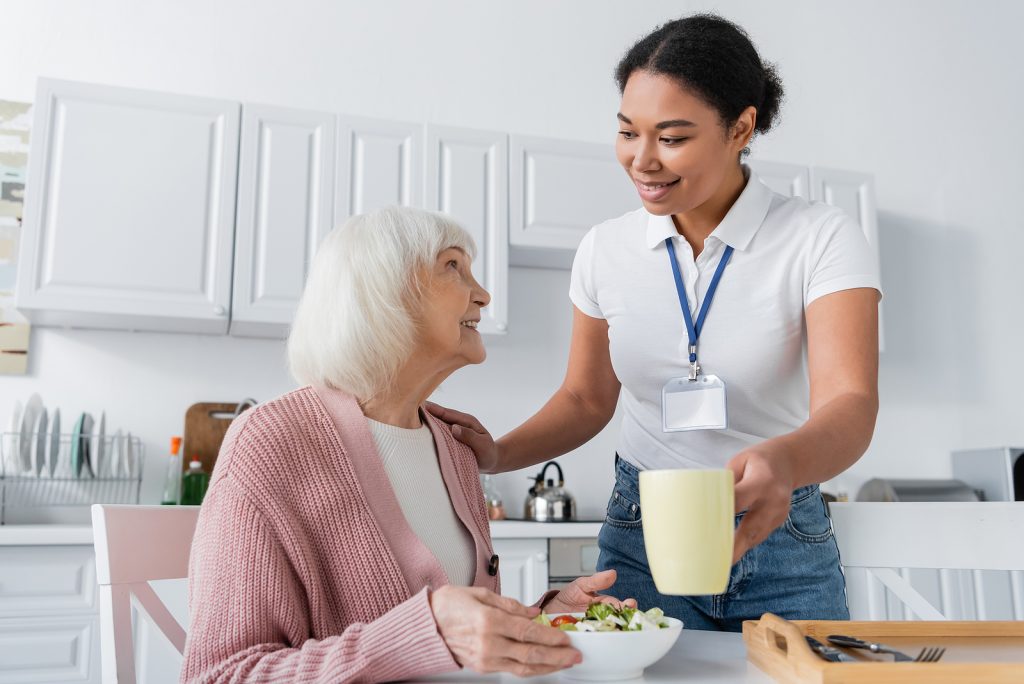

Staying hydrated is a big deal for people of any age, but it’s really important for seniors who have Alzheimer’s disease to get enough fluids. Dehydration can make Alzheimer’s symptoms worse and can lead to big health complications that are easily avoided. Working with Alzheimer’s care providers can make it easier for families to make sure their seniors are getting the hydration they need.
Hydration and Seniors with Alzheimer’s Disease
Getting enough water and staying properly hydrated helps to maintain cognitive function, keeps body temperature regulated, and supports overall well-being. If seniors aren’t getting enough fluids, they can experience confusion, urinary tract infections, and may find it difficult to engage in daily activities. Severe dehydration can bring bigger problems than that, even. Alzheimer’s disease affects how the brain works, and then lack of proper hydration makes that situation worse. Seniors with Alzheimer’s disease who are dehydrated may experience much worse cognitive function than they would if they were properly hydrated.
Taking Advantage of Hydrating Foods
Water is the first thing most people think about when it comes to hydration, but hydrating foods are equally important. Foods with high water content are tasty and they might be easier for seniors with Alzheimer’s disease to accept than plain water might be. These types of foods include soups, broths, smoothies, berries, and melons, along with other foods. Increasing these foods can boost hydration quickly and with little fuss.
Encouraging Frequent Sipping
After increasing hydrating foods, the next step is to encourage seniors to drink a little more water. Encouraging frequent sipping throughout the day is a good start. Putting ice in the water or using a glass that seniors really like can help them to enjoy the act of drinking a little bit more water.
Setting a Schedule
Routines are really helpful for seniors with Alzheimer’s disease. When home care providers work with families to set up a schedule for things like meals, snacks, and water breaks, seniors start to expect them. Creating routines makes hydration a part of their daily activities and helps them hit their goals around water intake.
Using Accessible Containers
If it’s not easy for seniors to use the containers their beverages are in, they’re not going to use them. Every senior has different needs and preferences, too. Alzheimer’s care assistance can help seniors to find the water bottles or glasses that they like the best, which helps them to stick with the plan in terms of hydrating more.
Adding Flavor
Plain water isn’t always a favorite beverage, especially for seniors with Alzheimer’s disease. Adding a little bit of lemon juice, lime juice, or even crushed mint can make the water more interesting without adding calories or sugar that might not be helpful. Sometimes water temperature is the problem, and seniors might prefer either room temperature water or water with ice. Experimenting helps figure these details out.
Keeping Track of Intake
Seniors in the earlier stages of Alzheimer’s disease might find it fun to use a hydration app or even just a food log to keep track of their water intake. In the later stages of Alzheimer’s disease, it can be more important to track intake, but Alzheimer’s care providers and family caregivers may need to handle that themselves. That data helps identify patterns and make adjustments when seniors need to for health reasons.
Addressing Swallowing Issues
In the later stages of Alzheimer’s disease, seniors often start to have more trouble with swallowing. That can make it difficult to eat and to drink enough fluids. There might be other solutions, like drinking thickened liquids or smoothies. It’s important that seniors are supervised when eating and drinking to make sure they’re safe.
Staying hydrated is something that people with Alzheimer’s disease may not remember to do on their own. Alzheimer’s care providers can make hydrating fun and easy, helping aging adults stay healthy and getting other types of support they need.
If you or an aging loved one are considering Alzheimer’s care in Cumming, GA, please contact the caring staff at Assisting Hands – Serving Forsyth and North Fulton County today at (770) 626-5150
Assisting Hands – Serving Forsyth and North Fulton County provides exceptional home care in Buckhead, Dunwoody, Sandy Springs, Roswell, Alpharetta, Johns Creek, Milton, Cumming, Gainesville, Suwanee and the surrounding areas in Georgia.
